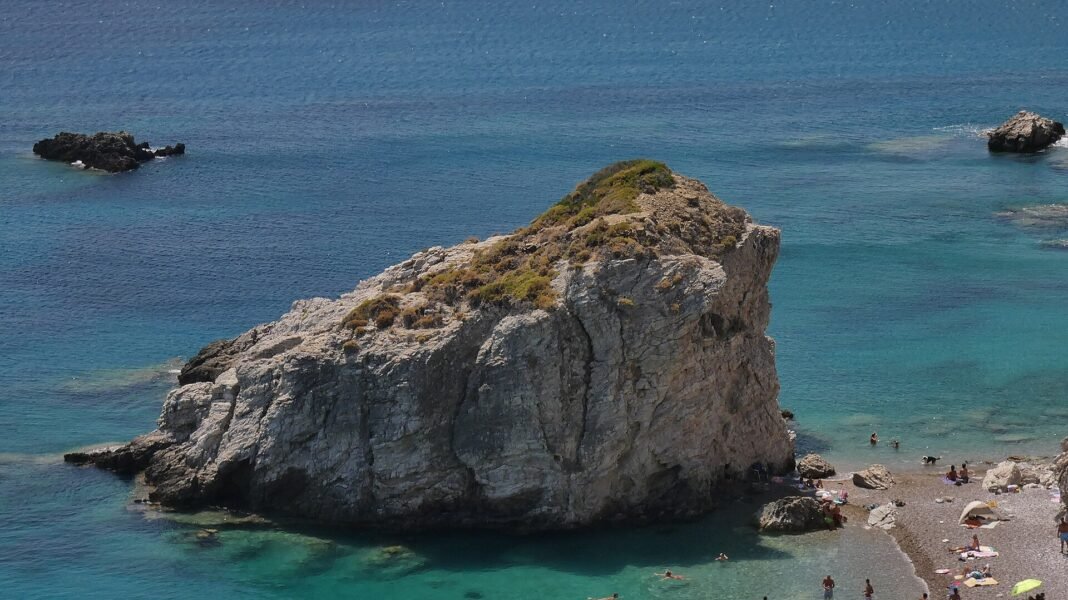
If you visit Greece’s island of Kythera and are tempted to try to sneak away with some of its famous sea salt, think twice—it’s considered stealing, and the island takes this offense quite seriously.
The Kythera property law is not exactly a law in the modern sense but rather a strict tradition established during Venetian rule of the island (1204–1797). It was later adapted into legal form by the British, who governed from 1809 to 1864, to protect Kytherian rock sea salt, a prized commodity both then and now.
Today, customary law regulates the traditional collection of dried sea salt by hand from the rock pools along the Kytherian coast.
This law applies only on Kythera, where anything that is not privately owned or rented does not belong to the state but instead to the island’s communal property, known as enhoria periousia, which roughly translates to “local asset.”

The British Home Property Committee now
During British rule, authorities established the Home Property Committee on the Ionian Islands. The committee allocated parts of the rocky coast, known as “salt pans,” to families in exchange for an annual fee, preventing disputes over this valuable and labor-intensive commodity.
For generations, Kytherans had collected their own salt from natural rock pools through a customary system in which families managed their own “salt pans.” Since Kytherian salt was commercially valuable, British authorities stepped in to regulate its collection.
The Home Property Committee was established to prevent quarrels and ensure fair distribution. Families were assigned specific sections of the rocky coastline, paying an annual fee in return. This system transformed long-standing tradition into a legal framework, making each family’s designated salt area clear.
The system turned long-standing traditions into a legal framework, ensuring that every family knew its designated area for salt collection. Ownership of public land, including the salt pans, was later transferred to local communities—and eventually the municipality—through measures such as the 1979 Law on Forestry Land and subsequent presidential decrees.
Today, the Domestic Wealth of Kythera and Antikythera Office (Enchorios Ploutos), which includes these public lands, is recognized as a Legal Public Entity (Νομικό Πρόσωπο Δημοσίου Δικαίου, ΝΠΔΔ) under the 2010 Kallikratis administrative reform law.
The office of Domestic Wealth of Kythera and Antikythera continues to manage and safeguard these resources under its specific governing legislation.
Salt collection on Greece’s island of Kythera
The hand-collection of Kytheran salt is a tradition that goes back centuries. Collectors remove the salt directly from the rocks using only their hands or a large ladle—a task far more demanding than it sounds.
Salt is harvested only in summer, when seawater in the rock pools dries completely. By late morning at around 11 to 12, the scorching sun makes the work unbearable, so collectors must fill their baskets quickly before leaving.
The effort is worthwhile. Today, Kythera has about thirty salt pan areas, each auctioned annually to the highest bidder by the committee. In earlier times, a town crier would walk through villages each May, announcing the start of the auction.
Kytheran salt is prized for its delicate taste and the difficulty of its collection, which drives its high market value. It is exported and featured in fine restaurants around the world.
This natural sea salt is a premium product. Its flakes contain beneficial minerals and trace elements, including high levels of potassium and magnesium, while being lower in sodium chloride, making it less harmful for hypertension. Any small foreign particles found in the salt usually come from sea plants—such as algae or moss—which enrich its distinctive flavor.
The Greek island also inspired Hermès, the iconic French luxury house, which recently launched a unisex perfume described as an ode to Kythera’s gardens, sunshine, and wild seas.


